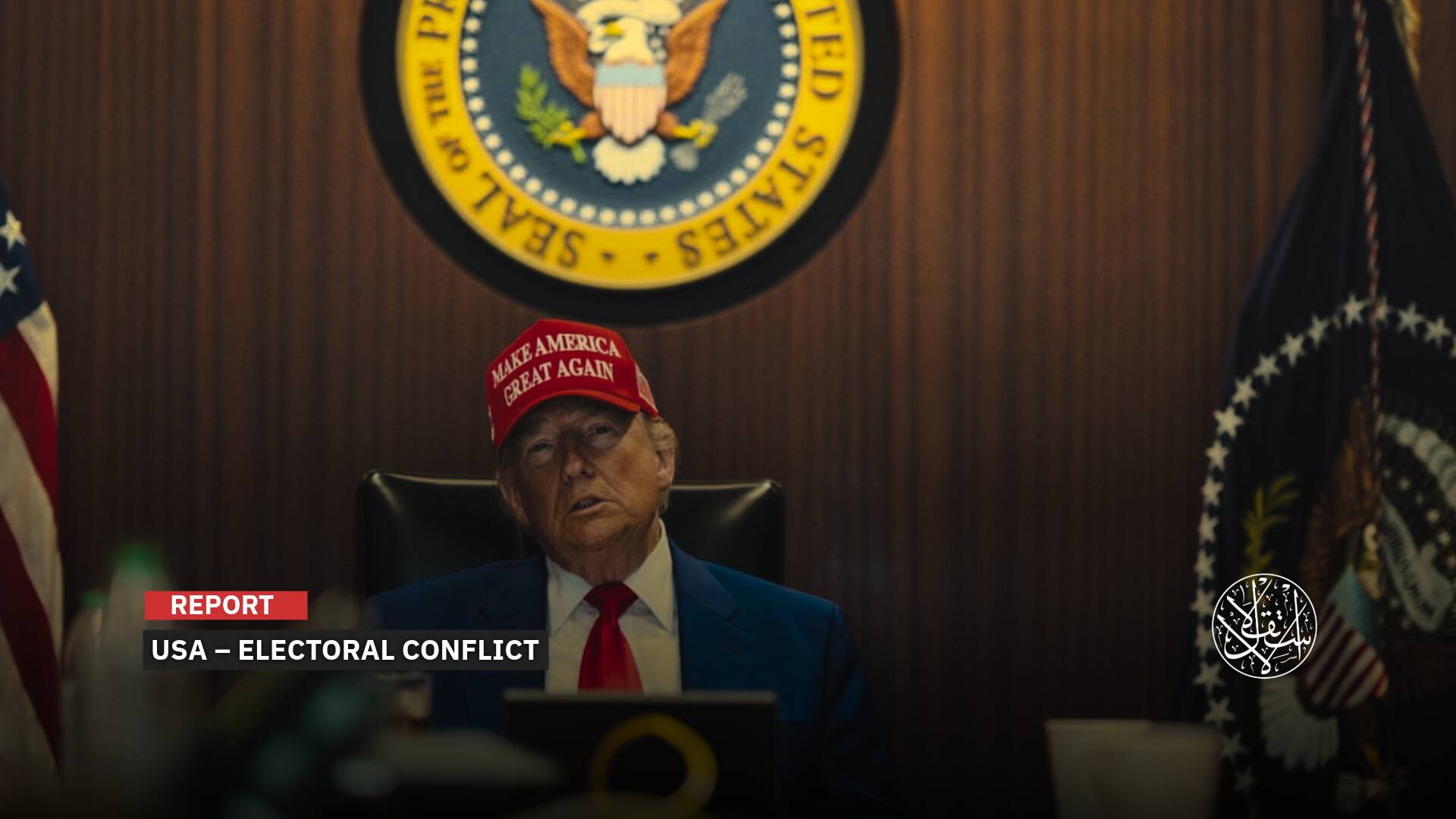The Conflict of the Right and the Left Is Pushing ‘Israel’ Into the Abyss

The plans of the far-right government of Benjamin Netanyahu in “Israel” to “reform the judicial system” faced a storm of popular protests and international criticism amid talk that moving forward on this path could push the Israeli Occupation into the abyss.
This tension between the executive and judicial authorities in “Israel” adds a new explosive element to the Israelis from within, in addition to the constant fears of the recent escalation of the Palestinian resistance and the insistence on liberating Palestine.
Big Struggle
In recent weeks, tens of thousands of Israelis have been taking to the streets to denounce bills being prepared by the right-wing coalition parties to undermine judicial oversight of the government.
The demonstrators, most of whom belong to left-wing movements and parties, fear that the new ruling combination will be able to overthrow the judicial system, which will “write the end of Israel” as a “democratic state,” according to their opinion.
Netanyahu, who has been on trial for years on charges of “corruption and breach of trust,” has been seeking through these amendments led by Justice Minister Yariv Levin of the Religious Zionist Movement Party, to undermine the judiciary, specifically the Supreme Court (the highest judicial authority), with the aim of canceling his trial.
In January 2023, Levin revealed these amendments, and Netanyahu defended them, claiming that they aimed at “strengthening democracy, rehabilitating governance, restoring faith in the judicial system, and rebalancing the three branches of government.”
These amendments, which are being discussed in parliament, limit the powers of the Supreme Court to cancel laws passed by the parliament, which is currently controlled by the far-right, and allow parliament to re-enact laws that were excluded by the court.
The amendments also give the government control over the appointment of judges and allow ministers to appoint legal advisers to their ministries, which is a major intrusion on judicial powers, and effectively excludes judicial oversight of the government.
According to the amendments, the parliamentary majority can pass a law even if the Supreme Court says it violates the country’s basic law, which the opposition sees as “the beginning of the end of democracy.”
In one form of this tension, the Supreme Court in “Israel” asked the Israeli Prosecutor, Gali Baharav-Miara, on February 10, 2023, to explain why Prime Minister Netanyahu did not step down from office in light of his trial on serious corruption charges and his government’s introduction of laws to weaken the judiciary.
Accordingly, Baharav-Miara gave Netanyahu one month to explain why he did not step down from office.
Prior to that, Baharav-Miara announced on February 2 that Netanyahu should move away from his government’s efforts to make changes to the country’s judicial system.
She said in a statement that Netanyahu may face a conflict of interest, citing his trial in corruption cases, stressing that the government’s proposed amendments to the judicial system “harm the democratic balance in Israel.”
Israeli Justice Minister Yariv Levin accused, in a statement, the Israeli public prosecutor of “trying to prevent the prime minister from expressing his positions” regarding reforms that he says will affect her powers.
Baharav-Miara was appointed under the previous Bennett Lapid government, which overthrew Netanyahu in 2021.
After only two days of this challenge, the Israeli Knesset Law and Constitution Committee, on February 12, put the draft amendments to a vote.
The vote resulted in changing two articles of the amendments regarding the formation of the Judges Selection Committee and preventing the Supreme Court from invalidating basic laws, according to the Israeli i24 News website.
The two articles aimed at changing the composition of the Judges Selection Committee, to be under the control of the coalition, were passed by a majority of 9 members in the coalition against 7 opposition members in the committee, and it is scheduled to be put to the vote later before the Knesset plenary consisting of 120 deputies.

Very Tense
The “coup” of the Netanyahu government, by moving to change the judicial law and reducing the powers of judges, and the “counter-coup” of the Supreme Court judges by moving the issue of dismissing Netanyahu on charges of corruption and then destroying his extremist government, created an atmosphere of great tension.
The Israeli public prosecutor had accused Netanyahu of bribery, fraud, and breach of trust in three separate cases, most notably his acceptance of gifts from wealthy businessmen and giving them privileges, in an attempt to polish Netanyahu’s image by their media.
On February 11, the government coalition promised to hold a session in the Supreme Court regarding Netanyahu’s removal as “an attempt to declare or announce such a move for an incumbent leader is a clearly illegal attempt to depose and overthrow an elected and legal government.”
This was in a joint statement signed by the heads of the parties forming the government coalition: Yariv Levin, Aryeh Deri, Bezalel Smotrich, Itamar Ben-Gvir, Yitzhak Goldknopf, Moshe Gafni, and Avi Maoz.
They said that there is no legal authority for any judicial body, including the Supreme Court, to decide on this, and indicated that only the people elect a prime minister.
They added that “a group of legal experts who do not respect the results of the elections are now working to implement an authoritarian coup and remove Prime Minister Netanyahu under the pretext of his inability to carry out his duties,” according to Yedioth Ahronoth newspaper.
Fearing an increase in protests against the amendments, some allies of Netanyahu’s party (Likud) in the government called for a compromise and siding with President Isaac Herzog’s plan in this regard, according to the same newspaper. MK Yuli Edelstein wrote on Twitter: “We should start talking to each other.”
On February 12, Isaac Herzog called for a halt to legislative proceedings related to judicial amendments until a broad consensus is reached about the details.
“This is not a political dispute,” he said in a speech. “We are on the brink of constitutional and social collapse.”
America is Worried
It was remarkable that US President Joe Biden stood by the opponents of Netanyahu and his government, as he implicitly described Netanyahu’s plan as harmful, saying: “Democracy is based on an independent judiciary.”
He indicated unequivocally that the United States would find it difficult to ignore the measures and their negative impact on the ongoing assessment in the United States.
His position came in response to a question by New York Times journalist Thomas L. Friedman, who talked about US officials expressing concern about Netanyahu’s plan.
He wrote in the New York Times on February 12 that this is the first time, as far as he can remember, that an American president has touched on an internal Israeli debate about the nature of democracy in the country.
He explained that Biden’s comment came at a crucial period and would stimulate and expand opposition to what Netanyahu’s opponents say is “a coup against the judiciary, which will distance Israel from the camp of democratic countries.”
Eldad Shavit, a researcher at the Israeli National Security Research Institute, called for taking Biden’s talk about the “legal coup” seriously.
He said Biden’s words should be taken seriously because he boasts that the importance of “Israel” to the United States “derives first and foremost from the US administration’s ability to present it as the only democracy in the Middle East.”
Also, these measures against the Israeli judiciary could have a direct impact on America’s relationship with “Israel,” especially in this sensitive period, in which security challenges are increasing, particularly on the part of Iran, which resolutely continues to enhance its nuclear program.
The Times of Israel reported on February 11, 2023, that the importance of Biden’s words is their timing, as the Knesset began three consecutive readings to pass the bill, and Netanyahu’s coalition seeks to launch legislation restricting the judiciary by April 2023.
During his visit to “Israel,” in January 2023, US Secretary of State Antony Blinken said, during his meeting with Netanyahu, that building a consensus around new proposals (for the judiciary) is the best way to make sure that they will be approved and steadfast.
Blinken called for preserving human and minority rights, the rule of law, freedom of the press, and the existence of a strong civil society in “Israel.”
The Yedioth Ahronoth newspaper quoted Netanyahu as saying, during his meeting with members of the Likud party, that Blinken’s statements were “flagrant, clear, stupid and unnecessary interference.”
Sources
- Explainer: Uproar over Israel judicial changes - what's it all about?
- Israeli Ministers Set to Advance Bill Effectively Revoking High Court's Power to Strike Down Unconstitutional Laws
- Netanyahu Advances Overhaul of Top Israeli Court, Drawing Thousands of Protesters
- Biden's Reference to the "Judicial Revolution": Israel Must Take These Remarks Seriously












